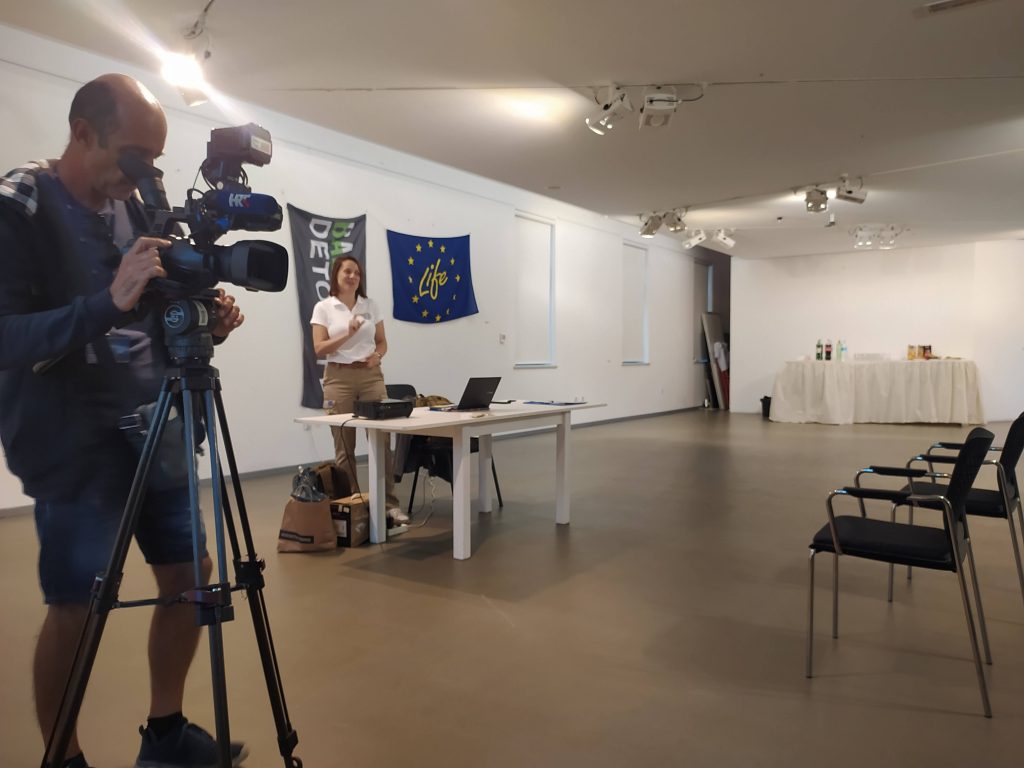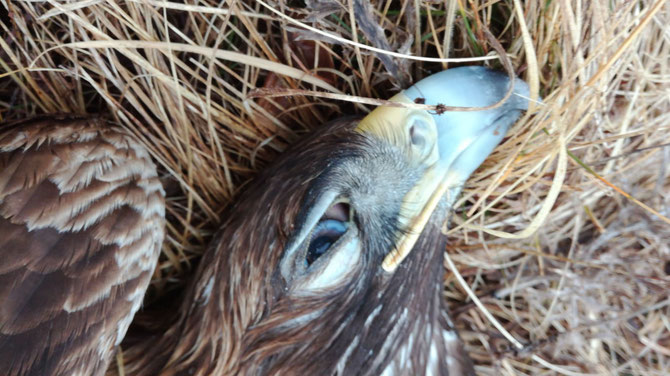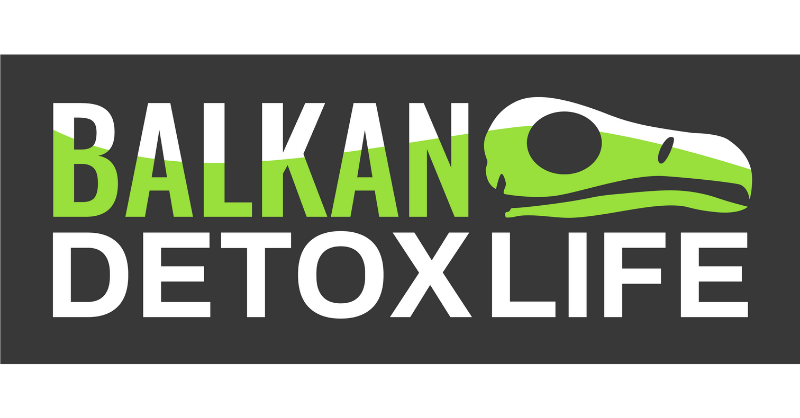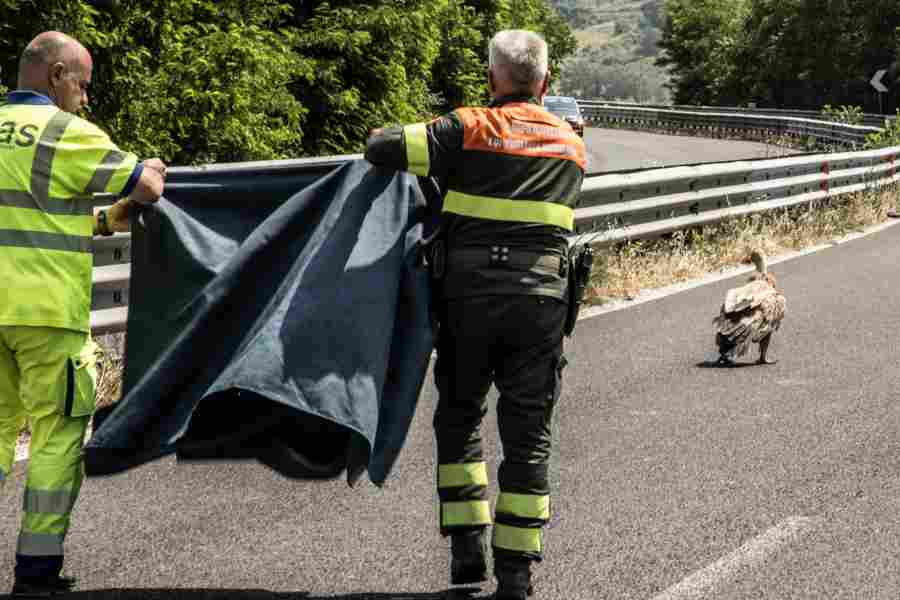
Wildlife poisoning is a common and significant problem in the central Dalmatian region. Humans, pets, livestock, and animals are all at risk – Environmental NGOs, veterinarians, hunters, the State Inspectorate and livestock breeders agree. As part of BalkanDetox LIFE, the Biom Association convened a meeting in Sinj, Croatia, on 21 September 2021, where representatives from all key groups discussed the problem and the necessary adjustments in the system and society to effectively prevent and end wildlife poisoning.
BalkanDetox LIFE aims to implement targeted actions to tackle the problem in Croatia
Nera Fabijanić from Biom opened the meeting by presenting the BalkanDetox LIFE project. The project began in 2020 and will end in 2025. Its goal is to improve national capacities to combat wildlife poisoning and create awareness about the issue throughout the Balkans.
Within the project, Biom will facilitate the development of an official wildlife poisoning task force that will include representatives from the Ministry of Economy and Sustainable Development, the State Inspectorate, forensic scientists and accredited veterinarians. Furthermore, they will devise a protocol that will allow cases of crimes against nature to be processed more efficiently. They will further raise capacities among representatives of Croatian law enforcement agencies to solve crimes against wild animals as part of the “Wildlife Crime Academy” initiative, a one-of-a-kind training programme in Spain. The capacities of national laboratories to evaluate toxic baits will be increased, and a regional system for rapid response to poisoning incidents will be developed based on tracking the movement of vultures throughout the Balkans.

© BIOM Association 
© BIOM Association 
© BIOM Association
During the meeting, stakeholders provided crucial insights on the issue of poisoning from their perspectives.
Urgent need to improve capacities to tackle this threat
In a couple of examples, Tanja Šurbat from the State Inspectorate indicated that defined protocols are urgently needed to effectively combat wildlife crime. Poaching, smuggling, and wildlife poisoning are all examples of illegal activities, for which it is critical that Croatia has official procedures that outline the steps, roles and responsibilities of all entities involved in the investigation. If there is no clear protocol in place, reports are processed slowly, diminishing the chances of the culprits being punished.
Poisoning can hurt poison bait users themselves and other unknowing victims
“There is no hunting season in which a minimum of 5-6 hunting dogs are not poisoned. Today is hunting day. I am nervous as I am waiting for a report from colleagues on the hunting grounds to check if we do not have any poisoned dogs, ” stated one hunter. “Poisoned meat can be eaten by wild animals. Those might be killed in some inaccessible location. A poisoned animal can be eaten by other animals or even might not die but killed by a hunter, which will unconsciously eat poisoned meat. Wildlife poisoning is a direct and indirect threat to wildlife, human health and our dogs,” said another hunter. “I do not poison wolves. To me, dogs are enough protection from them, but they also get poisoned. One year, the Kangal shepherd dog defended my herd from a wolf, but a few days later I found it poisoned,” shared one herd keeper.
Addressing conflict with predators – main motive for poison bait use
“One cannot discuss the problem of poisoning without debating the problem of livestock damage caused by wolves and wolf-dog crossbreeds,” Ivan Budinski, expert advisor for nature protection in the association Biom, began his presentation. “There is a significant problem with wolf-dog crossbreeding, there are small unstable packs – very dangerous for livestock – that are no longer afraid of man, and shepherds frequently cannot drive a wolf away from their calves. Cattle breeders are dissatisfied, believing that the only way to solve these conflicts is through poisoning. People should be given an alternative, the option of legal intervention against wolves, which will prevent them from engaging in illegal and environmentally unsustainable behaviour. With well-implemented measures, the wolf quickly learns to avoid guarded cattle and hopefully, we reduce the problem of wildlife poisoning.”
Poisoning is a threat to Croatia’s biodiversity

“The Golden eagle population can identify areas with high levels of wildlife poisoning. There are areas where there are no obstacles for a stable nesting pair of this magnificent raptor. However, there are gaps in the eagle distribution map where ranchers have problems with wolves or jackals, indicating that wildlife poisoning occurs frequently. Stopping the major threats is critical to preserving our biodiversity. Wildlife poisoning should be stopped.”- Ivan Budinski concludes. This was the first stakeholder meeting in Croatia for the BalkanDetox LIFE project. Two more meetings are planned for the next two years in the counties of Lika-Senj and Primorje-Gorski Kotar.
The BalkanDetox LIFE project

The ‘BalkanDetox LIFE‘ project aims to strengthen national capacities to fight wildlife poisoning and raise awareness about the problem in Balkan countries. It is a five-year endeavour with a €1.8 million budget, which aims to raise awareness and strengthen national capacities to fight the problem of wildlife poisoning across Albania, Bosnia & Herzegovina, Bulgaria, Croatia, Greece, the Republic of North Macedonia and Serbia. It received funding from the EU’s LIFE Programme, and it is co-financed by the Vulture Conservation Foundation, the MAVA Foundation and Euronatur, as well as by the Whitley Fund for Nature and Environmental Protection and Energy Efficiency Fund for specific actions. Project partners are the Vulture Conservation Foundation as the coordinating beneficiary, and the Albanian Ornithological Society, Association BIOM, Bird Protection and Study Society of Serbia, Fund for Wild Flora and Fauna, Hellenic Ornithological Society, Macedonian Ecological Society, Ornitološko društvo NAŠE Ptice and the Protection and Preservation of Natural Environment in Albania as associated beneficiaries. Furthermore, this project is based on Spanish best practice experience and counts with the support from the Junta de Andalucía and the Spanish Ministry for the Ecological Transition and the Demographic Challenge.




